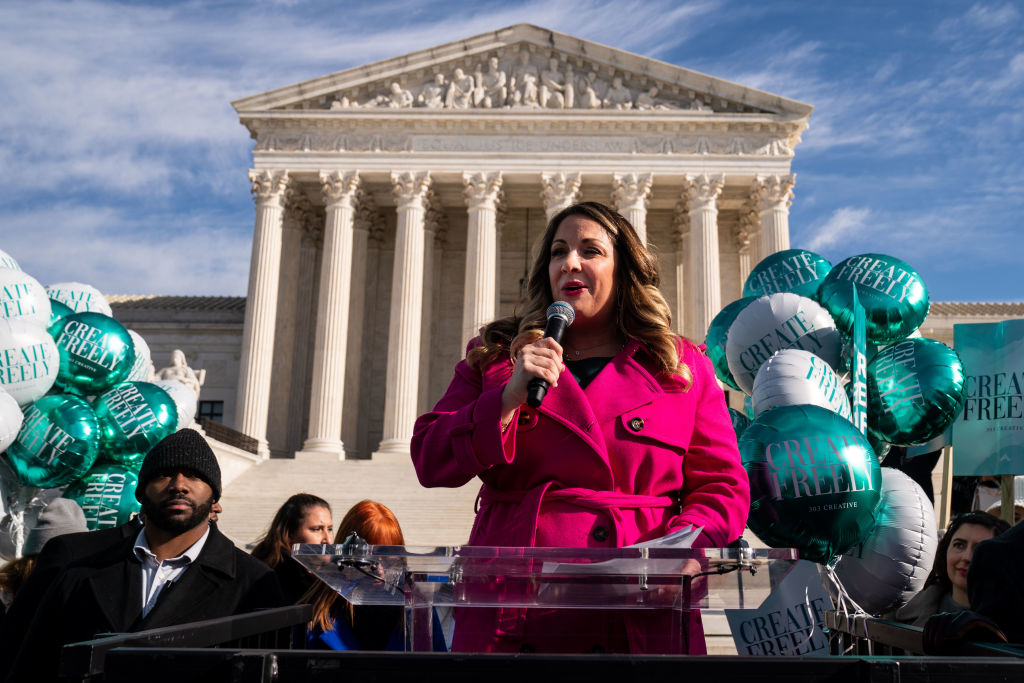Hey,
I’m not one of those fancy lawyers who works in an office and wears belts. So don’t expect a lot of that highfalutin legal talk; I’m no ex parte animal. I won’t even use semicolons because I leave it to judges to issue two consecutive sentences.
But I have been following the case of 303 Creative LLC v. Elenis, which was just argued at the Supreme Court. As I understand it, the case went to the Supreme Court in part because the 10th Circuit issued a spectacularly dumb ruling.
Here’s the gist. 303 Creative is a website and graphic design company. The 10th Circuit held that Colorado’s Anti-Discrimination Act gives the government the power to compel 303 Creative to provide wedding websites that “celebrate same-sex marriages” (if it opts to provide wedding websites that honor traditional, aka opposite sex, marriages). As my friend Ed Whelan writes, the majority “started off very soundly: it recognized that Lorie Smith, the owner of 303 Creative, is engaged in ‘pure speech’ when she creates wedding websites, that the websites ‘express approval and celebration of the couple’s marriage,’ that the Colorado law compels Smith to engage in speech that she opposes, and that the law is therefore subject to strict scrutiny.”
But then, as the belt-wearing Whelan notes, the majority started coloring way outside the lines. Because Smith is an artist, she holds a monopoly over her “custom and unique” services, or a “monopoly of one.” And because it’s a monopoly, refusing service to LGBT customers relegates “LGBT consumers to an inferior market.” Those consumers would “never be able to obtain wedding-related services of the same quality and nature as those that [Smith] offer[s].”
Now, as I said, this “monopoly of one” argument is very stupid and apparently no one actually made it at the Supreme Court this week. Because as dissenting 10th Circuit judge Timothy Tymkovich wrote, if you take the majority’s reasoning to its logical conclusion, “the government could regulate the messages communicated by all artists, forcing them to promote messages approved by the government in the name of ‘ensuring access to the commercial marketplace.’”
Still, the Supreme Court did entertain all sorts of wild hypotheticals in oral arguments over this case. On the Advisory Opinions podcast, David and Sarah run through many of them and explain why most of them were very, very silly. Could a black Santa be forced to sit with a white child in a Klan outfit? What if someone set up a restaurant called “Grandma Helen’s Protestant Provisions” and refused to sell to anyone who didn’t share her particular faith?
So, I want to pull out of all the legal stuff for a second and just talk about this like a normal person. On one level, it makes me feel like Tom Hanks in Big when everyone is hyped about toy buildings that turn into robots—“I don’t get it.” But on another level, it makes me feel like I’m an orangutan and someone in a lab coat is trying to teach me three-dimensional chess. I just want to flip over the whole thing and poop in someone’s hat.
I come to this as a writer. I don’t do work-for-hire for other people because I’m not good at it. I stopped being a television producer in large part because I hated writing for other people. I’m not good at stuff I don’t enjoy (“Some people would say you’re not even good at the stuff you do enjoy”—The Couch). But there are some people who do enjoy writing in other peoples’ voices. My wife is one of those people (Nancy French, David’s far-better half, is another). The Fair Jessica is a very accomplished speechwriter and ghostwriter.
Because I know what’s good for me, I don’t normally speak for my wife. But I think I’m on solid ground when I say that if a very left-wing politician (or some right-wing ones these days) asked her to ghostwrite a book that lays out the case for nationalizing industry, slashing defense spending, and massively increasing taxes, she’d decline. She’d also pass if a hardcore Muslim wanted her to write a book on why America needs Sharia law. Heck, she’d definitely turn down Donald Trump if he wanted her to write his memoirs, and not just because he’d probably refuse to pay.
Now, part of the reason she’d pass on such things is ideological. (In the case of the Sharia law example, religion might play a role, too.) But the main reason is that she’d just be a bad fit. Sure, she’s better at writing things she doesn’t wholly agree with than I am, but at some point, it would just be a waste of everyone’s time for her to sign on to a project she passionately disagrees with, because that disagreement would make her bad at it.
The upshot of a lot of these arguments is that motives matter. Like Jerry Seinfeld not being allowed to return a coat for spite, some motives are illegitimate. Now, as a moral matter, this might be true. But as a legal matter? I just get nervous when the government gets itself into the motive business.
And I don’t see why this should apply only to artists. What about lawyers? Everyone has a right to legal representation, but nobody has a right to a specific lawyer. If a lawyer refuses to take a gay rights case, does he have to prove his motives were legitimate? “I’m a patent attorney for Pete’s sake!”
Look, I’m not a purist on this. If you sell widgets, the law can bar you from discriminating against black, gay, or Jewish customers. But the idea that the law can compel artists—however you define them—to embrace ideas or beliefs they passionately oppose is just bonkers. And the fact that the ACLU has sided with state compulsion of artistic speech is just wildly depressing. Please don’t come back at me with wild, hypothetical edge cases where this basic observation might be vulnerable to correction. I’m sure such hypotheticals can be imagined. But that’s not how the real world works.
In the real world, people want to hire artists to do things they’re interested in—and, ideally, passionate about—doing. Sometimes it might take extra persuasion or money, but if there are irreconcilable differences, you find someone else to do the work. Normal black people wouldn’t want to hire a Klansman as a wedding photographer and normal Jewish people don’t want antisemites painting their family portraits. “Our noses don’t look like that! Do it again!”
I don’t dispute that it has been necessary at times for the state to fight bigotry. The federal government was right to crush Jim Crow. But Jim Crow was first and foremost a state intervention against state regulations, not an effort to correct a market failure. You know who opposed segregation on Southern buses? Southern bus companies, because it was an onerous and inefficient state regulation. Jim Crow was an example of domestic protectionism aimed at shielding plantation owners from more efficient and just labor markets. Preventing freed slaves from moving to better wages was at the heart of Jim Crow. The federal war on state-imposed Jim Crow was, in many crucial respects, an economically libertarian project.
That’s because one of the beauties of the market is that it places a cost on irrational bigotry. If you want to sell birthday cakes only to white Protestants, you’ll not only cut yourself off from lots of customers, you’ll also lose the patronage of lots of white Protestants who don’t want to support your Klan-baked goods. As I’ve noted before, in 1953, when August “Gussie” Busch bought the St. Louis Cardinals, he was angry that the Brooklyn Dodgers, equipped with Jackie Robinson, were beating the tar out of everybody else. When he asked his own organization how many blacks the Cardinals were bringing along, he was horrified to hear that the answer was none. “But,” he stammered, “we sell beer to everyone!” In 1954, the Cardinals had a black first baseman.
When you think about it, it’s weird that so many people want to force greater profits on people they think are bigots. In the moral universe I grew up in, if a store owner was rumored to be antisemitic, the last thing you’d do is give him your business.
I totally get why a gay couple would be pissed off at a baker who refused to make them a wedding cake. And I get the argument that the baker was wrong to refuse. But when you call the cops on the baker, you’ve got other priorities than getting a cake. You want to use the government to force people to violate their beliefs. Again, there are times and places where that might be necessary, but I think they’re few and far between. Plus, as Jim Crow demonstrates, beliefs imposed by the state aren’t always morally superior. State compulsion is a blunt and dangerous tool. It’s not well-suited to narrow, idiosyncratic, and isolated dissent from prevailing notions of the good and just.
What bothers me so much about the effort to use the power of the state to compel people to do what they don’t want to do is that it assumes that normal people can’t work this kind of stuff out on their own. As a Burkean, I admit to being more comfortable than most with letting society work out its problems. “I must bear with infirmities until they fester into crimes,” Burke said.
If Grandma Helen wants to sell cornbread only to Zwinglians or Missouri Synod Lutherans, I’ll get my cornbread elsewhere. What do I care? But if the government says Helen can’t sell to non-Protestants like me when she wants to, well, I’m getting a lawyer—preferably one who agrees with me.









Please note that we at The Dispatch hold ourselves, our work, and our commenters to a higher standard than other places on the internet. We welcome comments that foster genuine debate or discussion—including comments critical of us or our work—but responses that include ad hominem attacks on fellow Dispatch members or are intended to stoke fear and anger may be moderated.